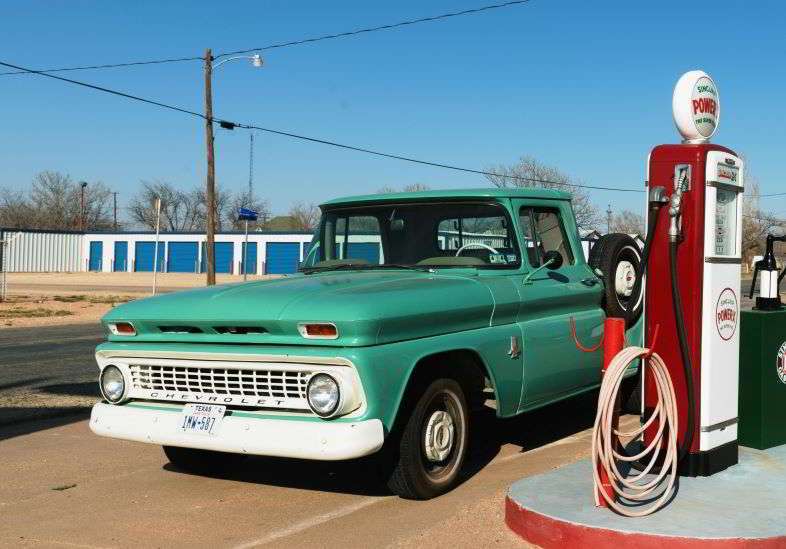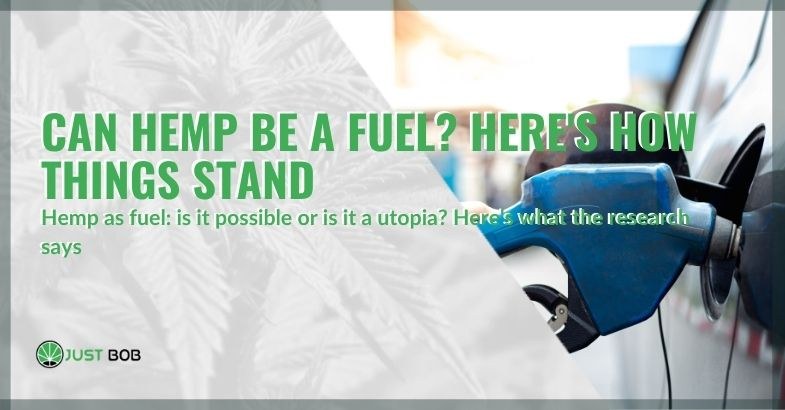Modified on: 21/03/2024
HEMP AS FUEL: IS IT POSSIBLE OR IS IT A UTOPIA? HERE’S WHAT THE RESEARCH SAYS ABOUT HEMP PLANT AND FOSSIL FUELS
We usually hear about cannabis and cannabis light regarding to the effects of their substances on humans, but since ancient times these plants have also been used to make products and materials for other purposes.
In addition to producing CBD oil, hashish and medicines, hemp is also cultivated to produce textiles, building materials, plastics… and hemp can also be used as a fuel.
Yes, that’s right.
Ethanol and biodiesel can also be made from this versatile plant.
Here, you can find out how these substances are produced, which engines they can be used in and the advantages of using them as a substitute for our usual fuel.


Environmental Issue
The environmental potential of using hemp or cannabis as a fuel source is significant and offers promising solutions to address the challenges of climate change and fossil fuel dependency. Hemp, known for its versatility and high biomass yield, presents a sustainable alternative to traditional fossil fuels. By harnessing hemp biomass through processes like dry distillation or anaerobic digestion, renewable energy sources such as hemp biodiesel, hemp biofuel, and hemp biogas methane can be produced. These bioenergy products offer several environmental benefits, including reducing greenhouse gas emissions and mitigating climate change.
Compared to petroleum-based fuels, hemp-derived fuels are carbon neutral or even carbon negative, meaning they absorb more carbon dioxide during cultivation than they emit during combustion. Additionally, hemp cultivation can help sequester carbon in the soil, contributing to carbon capture and storage efforts. With proper management practices, hemp cultivation can also improve soil health and remediate contaminated soils, further enhancing its environmental value.
Moreover, the versatility of hemp extends beyond fuel production. Hemp fibers and hurd can be utilized in building materials, reducing the carbon footprint of construction projects. Hemp oil extracted from seeds can be used as a liquid fuel or processed into biodiesel, offering cleaner alternatives for diesel engines. The potential for hemp-derived products to replace petroleum-based materials and fuels across various industries highlights the role of hemp in transitioning towards a greener future.
However, to fully realize the environmental benefits of hemp fuel production, several challenges need to be addressed. This includes developing efficient harvesting machine designs, establishing processing facilities, and optimizing the supply chain for hemp cultivation and fuel production. Additionally, policies and regulations that support hemp farmers and producers are essential for promoting the widespread adoption of hemp as a renewable energy source.
In conclusion, harnessing the energy potential of hemp and cannabis offers a sustainable pathway towards reducing emissions and transitioning to renewable energy sources. By investing in hemp development and promoting hemp fuel production, we can move towards a more sustainable and environmentally friendly energy future.
How are Biofuels Made from Hemp?
To understand how to make ethanol and how to make biodiesel from hemp biomass, we need to start with two different parts of the plant.
Biodiesel is made from the seeds of the cannabis plant, while ethanol is made from the juices and oils obtained from the stalks.
Ethanol, more precisely, is produced either by fermentation of the hemp or by pyrolysis, while biodiesel is produced by processing the oil from the seeds (each seed has 35% of its weight in oil).
So when you decide to grow CBD cannabis for biofuel, you can get both products from the same plantation.
But what are the advantages of producing and using these products?
Read also: Hemp plastic: how to get rid of microplastic pollution
Advantages and Properties of Hemp Biodiesel and Ethanol: What Are They?
Using industrial hemp as a fuel in the form of ethanol or biodiesel has many advantages, both from the environmental and human health points of view.
The main ones are these:
Absence of sulphur
No bad smell
Does not pollute
3 times less flammable
Energy production at lower heat levels than petroleum derivatives
So, if all means of transport today used fuels made from hemp, the changes would be considerable.
Think about the smell issue.
In how many cities have you experienced a headache-inducing, unpleasant smell of car exhaust? Surely many. The use of hemp ethanol and biodiesel would be a panacea in this respect too.
Some studies, on the other hand, claim that after just a few years, a reduction in air pollution-related diseases can be observed.
In short, the fact that hemp fuel is pollution-free has positive effects from several points of view: it respects the health of the air, and consequently of the water, the soil and humans.
But do you need special engines to use these fuels, or can they be used in any car or vehicle?


Hemp as Fuel: Where Can It Be Used?
Faced with all the advantages listed in the previous paragraph, you may be wondering whether hemp biofuels can be used to power any engine or whether any modifications will need to be made before they can be used.
No modifications needed!
Hemp ethanol can be used in any engine, but what’s more, it can also deliver a higher performance than petroleum-based fuel.
So the engines on which hemp-derived ethanol and biodiesel can be used are those in ordinary cars as well as more sophisticated ones in ships and aircraft.
But that’s not all.
They can also be used to power thermo-electric power stations, generator sets and company plants.
Tests, some of which have been carried out in Europe for around 20 years, show that hemp fuels are not only perfect for use in normal engines, but also to extend their life because they have lubricating properties.
So the higher yield with the consequent reduction in fuel consumption and the need for less maintenance also make hemp biofuels a much cheaper solution!
Read also: Hemp cigarettes: how they are made and what their effects are
To Conclude…
In conclusion, the potential of hemp biofuel as a viable alternative to fossil fuels stands on solid ground, supported by extensive research and promising developments in hemp production and bioenergy technologies. While some may view hemp as a utopian solution to our energy needs, the evidence suggests otherwise. Studies have shown that hemp biomass, with its high energy yield per hectare and ability to sequester carbon dioxide during cultivation, holds great promise for sustainable energy production and reducing greenhouse gas emissions.
Research into hemp biodiesel, hemp ethanol, and other forms of hemp biofuel production has demonstrated their feasibility and environmental benefits compared to conventional fossil fuels. Hemp biomass can be converted into various liquid and solid fuels through processes like anaerobic digestion, cellulolysis, and dry distillation, offering cleaner alternatives for diesel engines and energy production. Additionally, hemp biochar and hemp pellets provide opportunities for solid fuel production, further diversifying the potential applications of hemp in energy generation.
However, realizing the full potential of hemp biofuel requires continued investment in hemp cultivation, processing infrastructure, and bioenergy research. Policies and incentives that support hemp producers and biofuel production are also essential for scaling up hemp energy production and reducing dependence on fossil fuels.
In summary, while challenges remain, the future of hemp biofuel looks promising. With ongoing advancements in technology and a growing recognition of the environmental benefits of renewable energy sources, hemp biofuel has the potential to play a significant role in our transition towards a more sustainable and greener energy future.
That said, if you are passionate about CBD weed and also love collecting its derivatives, we invite you to visit our CBD online shop.
Choose your favourite products from legal hashish, CBD oil and special infusions and we are sure you will find what you are looking for.
We look forward to seeing you on Justbob!









